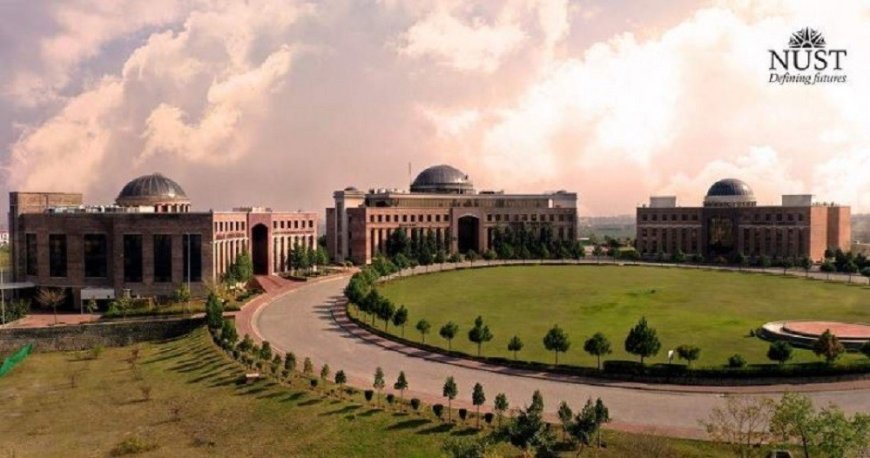NUST Institute of Policy Studies Holds Webinar On Peace In Afghanistan
NUST Institute of Policy Studies coordinated an online class on the possibilities of harmony in Afghanistan in the wake of the US

NUST Institute of Policy Studies coordinated an online class on the possibilities of harmony in Afghanistan in the wake of the US exit here on Wednesday.
Named, "Afghanistan at Crossroads: Promise of Peace and Geopolitical Imperatives," the online class united famous specialists, veteran security investigators, think tank pioneers, and researchers to examine the difficulties of building up harmony in the artical-US future in Afghanistan.
Lt Gen (Retd) Naeem Khalid Lodhi, previous Defense Secretary of Pakistan, expressed that the US exit was spurred by the American craving to cut misfortunes in Afghanistan.
He said that Afghanistan's neighbors need to act with development and profound comprehension of territorial security elements to have the option to contribute emphatically to standardization in the conflict torn country.
Dr Syed Hussain Shaheed Soherwardi, Professor of International Relations at the University of Peshawar, focused on the requirement for intra-Afghan discussions to attempt to agree on a satisfactory future administration model for Afghanistan, which both addressed the worries and resounded with the goals of various areas of Afghan culture and nation.
Dr Vladimir Kozin, Leading Expert, Military-Political Studies Center at the Moscow State Institute of International Relations (MGIMO), expressed that harmony in Afghanistan required the absolute shortfall of unfamiliar soldiers just as endeavors for fast financial advancement without the two of which Afghans would not have the option to discover thriving and solidness.
In such manner, Dr Kozin said global advancement associations and significant forces expected to submit significant material help to Afghanistan.
Dr Ahmet Uysal, Director, Center for Middle Eastern Studies (ORSAM), Ankara, Turkey, said that assuming past was any pointer of how things could occur in future, it was impossible that the US would totally pull out from Afghanistan.
Dr Uysal focused on that, as opposed to intercede and meddle in Afghan undertakings, it was the obligation, all things considered, to help Afghans assemble harmony earnestly with no ulterior thought processes.
Must Read: KP Launches an Application to Help Students Prepare for Exams
Lt Gen (Retd) Zahid Latif Mirza, Former Secretary Defense Production, said that Afghanistan had been crushed by the elements of conduct of significant forces.
He said that the propensity of South Asian struggle elements to be projected into the Afghan circumstance had additionally sabotaged the reason for harmony.
Sayed Ishaq Gailani, veteran Afghan legislator and the Founder of National Solidarity Movement of Afghanistan, expressed that the circumstance in Afghanistan was unstable, and that there was a danger that the US exit could prompt further clash.
Mr Gailani lamented the wretched condition of advancement in the country and said that common conflict, in the event that it occurred, will be a misfortune.
Dr Ashfaque Hasan Khan, Principal, School of Social Sciences and Humanities, called attention to the likelihood of production of division and areas in Afghanistan in future that could hamper harmony and compromise.
Lt Gen (Retd) Masood Aslam, Former Ambassador of Pakistan to Mexico, said that the Taliban had made considerable progress since 2001.
He referenced that their political and strategic insight presently was far more honed than in the past as was confirmed during their conferences with the U.S. just as the intra-Afghan discussions. He expressed that if the US was not kidding about harmony in Afghanistan, it should attempt to shape a break solidarity government in Afghanistan before exit.
Maj Gen (Retd) Syed Khalid Amir Jaffery, President, CGSS, Center for Global and Strategic Studies (CGSS), expressed that the U.S.
had consistently changed the goal line in Afghanistan because of which the end state in Afghanistan was foggy. He said that there was a need to focus on the job of intermediaries that didn't want harmony in Afghanistan.
He said these powers were the very that likewise needed Afghanistan's neighbors to be upset.
Brig (Retd) Mahmood Shah, eminent master of Afghan issues, exhorted that Pakistan expected to help Afghanistan in artical-struggle country building while at the same time guaranteeing that it was not maneuvered toward making any stride that disagreed with its own drawn out dependability, security, and advancement. Reuters
